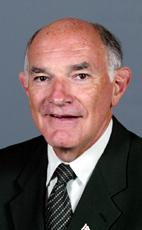Mr. Speaker, I have an opportunity today to comment on the government's budget and to highlight its main components which, I believe, will benefit all Canadians in the short and long term.
I would first like to commend the government-unlike my colleague from across the way-for respecting the voters' will,
which was clearly expressed as regards taxation. Canadians do not want any tax hike, because they believe that they are already paying their fair share of taxes.
The government has chosen to fit this tax freeze into an overall strategy which consists in guaranteeing our financial future while continuing to put our public finances in order. In this regard, the 1996 budget is consistent with the 1994-95 budget, and this will enable us to reduce the deficit to $24.3 billion in fiscal 1996-97 fiscal year, or 3 per cent of the GDP. This development shows that the Minister of Finance will undoubtedly meet his deficit reduction targets.
Given the delicate state of the Canadian economy at the present time, the federal government could have opted for harsher measures. In fact, some provincial governments, such as the Ontario government, have chosen this path which, I think, does nothing but exacerbate the economic problems we face. The Liberal government rejects any solution based on ideologies that are narrow and prejudicial to Canadians. Our attitude toward the economic changes that have to be made is one of pragmatism and fairness to all levels of our society.
I will give as an example the Canada Health and Social Transfer, which will benefit from secure, stable and increasing funding over five years, receiving $25.1 billion the first two years and an increase based on economic growth for the next three years.
I will say that, contrary to what some sovereignists are saying, there is no new reduction of transfers to the provinces. This criticism is unfounded because it refers to the reductions announced in the 1995 budget. On that subject, I would like to indicate that those reductions from the 1995 budget represent 3 per cent of provincial revenues, not the astronomical amounts mentioned by our critics.
The most disadvantaged in our society will not be forgotten in this budget and by this government. Budget cuts will not be made on the back of students. All Canadians can count on stable funding for health insurance.
Do these measures aimed at securing the future of social programs come from a government that could not care less about the well-being of the community? Do these measures bear the mark of this economic laissez- faire, both unbridled and lacking in social conscience? No. These measures show the will of the government to guarantee the social programs that Canadians presently enjoy while allowing for fiscal consolidation.
I was quite pleased by some of the measures announced by the finance minister. He announced two specific improvements that will benefit children. One measure will see the child care deduction extended to passive income such as unemployment insurance.
I had proposed this amendment to the finance minister which was spurred by the experience of a co-operative education student and constituent, Ms. Janet Lewis, who worked in my office. She was on unemployment insurance at that time and therefore could not claim the child care deduction even though she needed child care in order to get her high school diploma. This inequity has now been addressed in the government's budget.
I would also like to mention that the new budget will give $250 million more a year in supplementary assistance to some 700,000 low-income Canadian families, a third of which are single-parent families.
This is quite significant since the earned-income supplement under the child tax benefit will be doubled in the two next years, going from $500 to $750 in July of 1997, and to $1,000 in July of 1998. Let us not forget that our children hold the future of our country in their hands and that child poverty represent a threat. I think that that initiative will bring more social and economic equity in Canada.
I noticed with pleasure that the government dealt with the situation of youth on the job market by reallocating funds from other programs to the Student Summer Employment Program. That is a step in the right direction. Nonetheless, I hope that the government will take more initiatives to create more new jobs for all Canadians.
In this regard several initiatives come to mind. The government's infrastructure program is a fine example of job stimulation, obviously benefiting the workers who obtain direct jobs from the project but also the economy as a whole. The future continuation of this program would, I believe, be beneficial to Canada's economy.
A project to stimulate the construction industry would also go a long way on the job front. This project, apart from the creation of construction jobs and industry spin-offs, would also contribute to the social development of communities, allowing the government to kill two birds with one stone.
By bringing changes to old age pension benefits, the government is once more confirming its support of the principle of equity by better targeting benefits in order to give better support to low income Canadians and by reducing or eliminating benefits to high income seniors. Liberals have not forgotten the concept of a just society. They stand by it and have shown it in the budget.
Need I mention, as many hon. members already did, that the new seniors benefit will be tax free and fully indexed?
This budget is based on a sense of moderation. It will allow the government to reach its goal of fiscal consolidation. In fact, the government acknowledges the need to put its fiscal house in order but not at the expense of a just society.
Economy is only a means of making society work. It is not an end per se and should never be.

